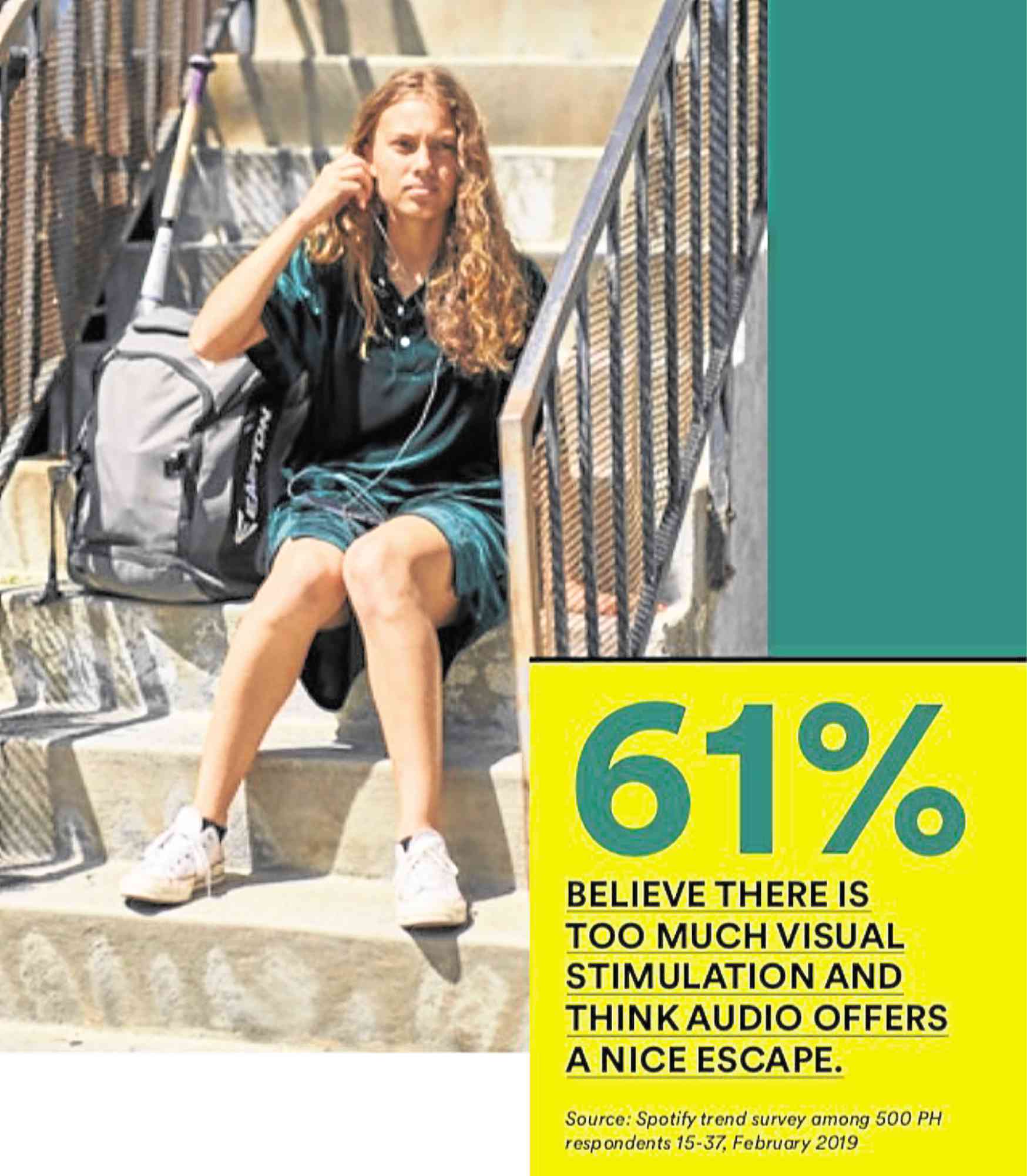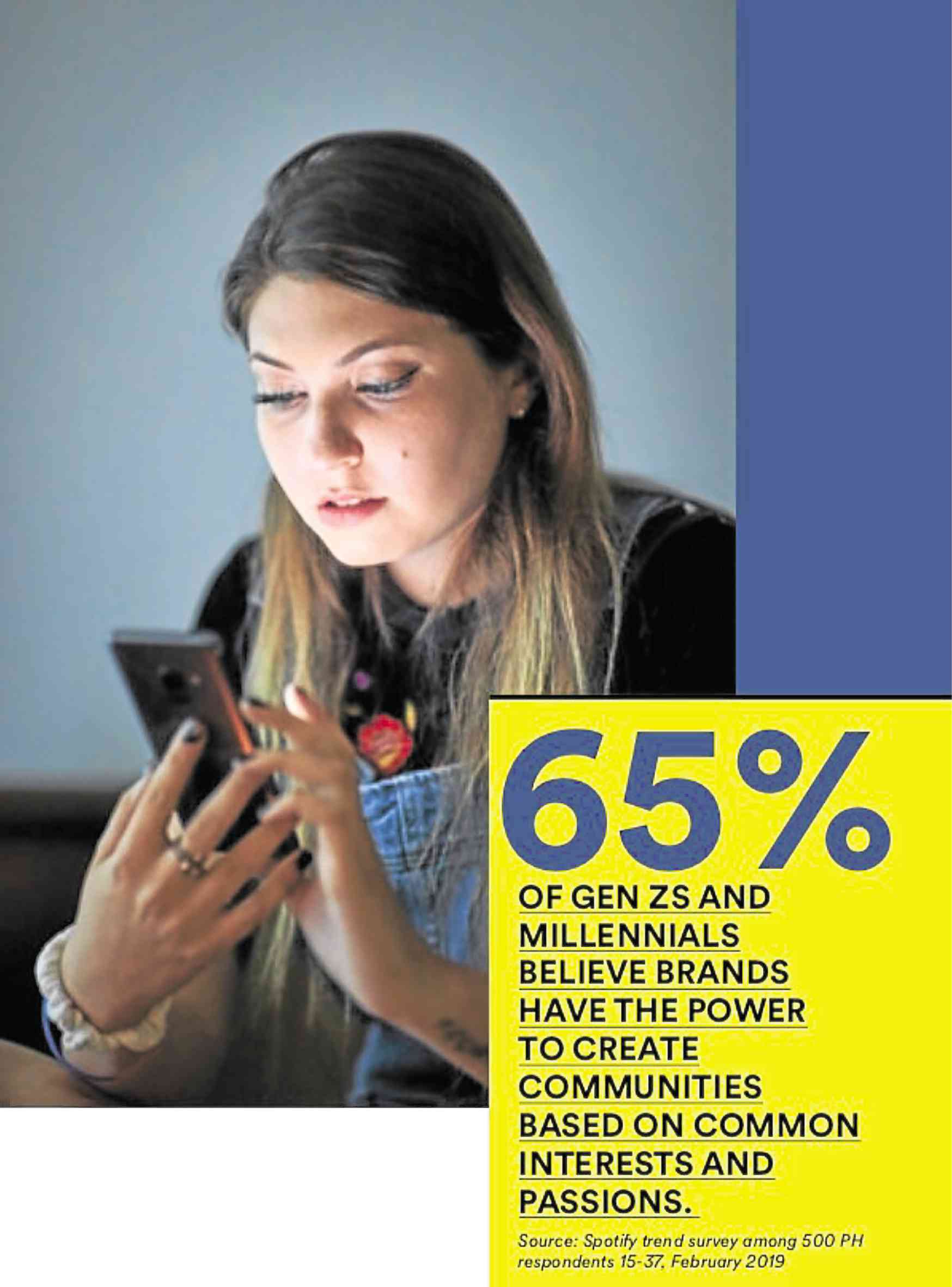Gen Zs, millennials give brands all the feels
Digitally native, emotionally in touch, highly engaged, and politically “woke.”
These are distinctive traits of Gen Zs (15- to 24-year-olds) and millennials (25- to 38-year-olds) that brands should pay attention to if they want to connect with this consumer base, particularly through sound and music, says a recent global trends report by audio streaming platform Spotify titled “Culture Next.”
The study took Spotify to eight markets—the United States, the United Kingdom, Mexico, Brazil, France, Germany, Australia and the Philippines—where they conducted a combination of qualitative, quantitative and first-party data analysis, looking at Gen Zs and millennials.
They also held focus group discussions in four US cities (New York, Los Angeles, Nashville and Miami), global assignments among 16 young influencers and trendsetters in all markets, as well as expert interviews.
A global survey among 4,000 respondents (500 respondents per market) was also conducted during the first quarter of the year.
Spotify then analyzed their unique streaming intelligence and first-party data to support both macro and micro trends in audio, as well as in broader culture.
The study resulted in Spotify’s discovery of five trends among Gen Z and millennial consumers. These are:
Band of others. According to the report, Gen Zs and millennials are forming communities—or “tribes”—across the globe.
They have started to see themselves more as “global natives,” with 42 percent saying that they identify more as a global citizen rather than a citizen of their own country. Sixty-one percent also said that they were friends with someone from another country online.
These communities don’t just offer a sense of belonging—they also give Gen Zs and millennials a purpose. The report makes an example of Manila’s underground punk scene, “a semi-itinerant subculture that comes alive in secret shops and venues.”
“While their devotion to a DIY (do-it-yourself) lifestyle—hitchhiking to get around, tattooing for barter, collecting uneaten food, sharing everything—comes with risk, it’s also a response to a political climate they oppose. Dressing in a radically different way from straight-and-narrow citizens is itself an act of protest, as is making music that criticizes the establishment,” the report reads.
Moreover, according to Spotify’s research, 78 percent of Filipino Gen Zs and millennials, like past generations, believe music connects people and cultures.
Spotify advises brand marketers to reach these consumers through genre-based targeting in real time.
It makes an example of Snickers’ “You’re not you when you’re hungry” campaign, for which the brand crafted messages for three distinct streaming groups based on the genres they listened to—pop, rock and grime.
Spotify also suggests that brands engage Gen Z and millennial tribes IRL (in real life) by sponsoring small events, like a concert of emerging artists, to engage microcommunities in their markets.
Subliminal attraction. Digital is changing how people discover things, with social media strongly influencing people’s real-world choices. According to Spotify’s research, 42 percent of Gen Zs and millennials said that culture today was influenced not just by one defining group—such as celebrities, brands politicians, online influencers—but by a mix of all of them.
Focusing on sound and music, Spotify says in its study that podcasts, while less “splashy” than the visual social media feeds, are also influential media tools because they are seen as reliable and trustworthy. The report describes Manila’s podcast scene as “burgeoning” with titles such as “First World Manila” discussing urban and economic development policies.
On Spotify, the study revealed that Gen Zs and millennials found a new way to consume music, and particularly enjoyed discovering new songs and artists they would never have found on their own. Seventy-two percent of respondents said that discovery boosted their happiness, while 66 percent said it upped their energy levels.
Brands and marketers, the study states, can therefore “tap into discovery moments” on the audio streaming platform, by, say, sponsoring a playlist (top Pinoy picks include OPM Favorites, Chillax Ka Muna!, and #Hugot), in order “to get a halo effect from Spotify’s ability to drive new music discovery.”
“Polyfly.” Gen Zs and millennials are, as they say these days, woke—politically, environmentally, socially. Respondents, when asked what ideals brands should convey in their messaging, picked social responsibility, environmental protection and equality as their top choices. Seventy-three percent of respondents also said brands needed to promote progressive values and play a more meaningful role in society.
The report goes on to highlight some of the recent issues in Philippine politics, which have been the subject of countless protest marches and prayer rallies: the Tax Reform for Acceleration and Inclusion Act, drug war, misogyny, labor laws, “Oplan Tambay,” the age of criminal responsibility, #ChildrenNotCriminals and #BabaeAko, among others.
In such gatherings, music has played a big role, states the report. A couple of examples: In 2017, rap group One Pro Exclusive eulogized their friend killed in the drug war with the piece “Hustisya,” and a Filipino rendition of “Les Miserables’” “Do You Hear the People Sing?” went viral before the National Day of Protest.
To engage this political generation, brands need to make a stand on issues relevant to them—and make sure they back up that stand with concrete action. They can also empower Gen Zs and millennials by sponsoring innovative programs, such as Spotify’s Sound Up Bootcamp, which taught specifically women of color in June last year how to create their own podcasts.
All the feels. Gen Zs and millennials are more aware now of their mental health and are taking steps to take care of it. According to the study, 61 percent of respondents said they would rather stay home and sleep in rather than go out. This group are also mindful of their physical health—they work out, eat well and get a good night’s rest instead of enjoying the nightlife.
Music, too, plays a big role in Gen Zs’ and millennials’ well-being as 58 percent of those surveyed said they turn to music to cope when they are sad. Brands, therefore, can seize the opportunity to brighten up their audience’s day through Spotify’s platform, as the report suggests, by infusing “happy” playlists with their own positive messages.
Surround sound. Finally, the report reveals that Gen Zs’ and millennials’ lives are always accompanied by a soundtrack. Whether they’re working out or just walking outside, this demographic almost always have headphones on (the study found that 84 percent of respondents own headphones, while 67 percent own a Bluetooth speaker).
Among Filipinos, in particular, 61 percent said they “think audio offers a nice escape” from all the visual stimulation in media.
Brand marketers should then consider that listeners are now tuning in from everywhere, all the time—which means more platforms on which they reach their audience. Just think of the possibilities: mobile, desktop, smart televisions and speakers, gaming consoles, wearables and even connected cars.
“Empathetic brands who understand where this generation is coming from and where they’re headed—as laid out in the five trends above—will be better equipped to connect in a real way with their desired audience right here in the present,” the report states.


